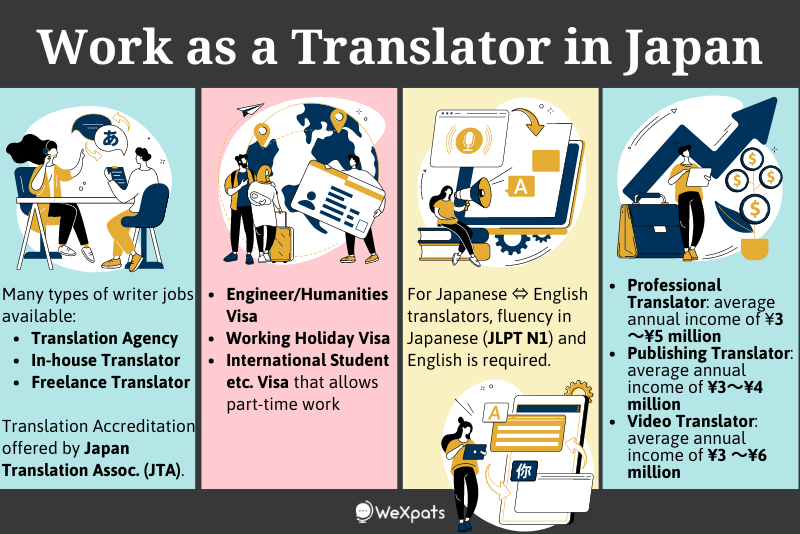Becoming a Japanese translator in Japan is a rewarding career path for those with a passion for languages and a deep interest in Japanese culture. Want to become a translator in Japan? Find out how here.
First Published: 2021-01-14
Updated: 2024-06-18
Table of Contents
- A Look at the Translation Industry in Japan
- How to Become a Japanese Translator
- Translator Salary in Japan
- Find a Job in Japan with WeXpats Jobs
 Are you having any issues with job-hunting in Japan?
Are you having any issues with job-hunting in Japan?
A Look at the Translation Industry in Japan

The translation (and interpretation) industry in Japan is a significant one that plays crucial roles across various sectors like global trade, tourism, technology, and entertainment (anime, manga, and video games especially). As Japan becomes more globalised, the demand for translation services grows.
The translation industry in Japan encompasses various players:
-
Translation Agencies: Agencies that specialise in providing translation, interpretation and localisation services. Employs a large number of translators to keep up with demand.
-
In-House Translators: Larger corporations often maintain dedicated translation departments or teams to handle ongoing translation needs. Depending on the industry, such as game developer or publishing company, a large number of translators may be employed.
-
Freelance Translators: Many translators operate independently, specialising in specific fields or languages, and offering their expertise to diverse clients. Freelancers usually work on a project basis, it may be a long-term or short-term project.
Writer's Pick
How to Become a Japanese Translator

Find out what are the requirements to become a Japanese translator working in Japan.
Educational Background
A Bachelor’s degree in translation, Japanese or another language is typical for translators. However, the most important thing about translation is fluency in languages so having a background itself is not sufficient. Most translation jobs require a translation test to prove yourself. In fact, having a totally unrelated degree or educational background is also acceptable as many translators are self-trained.
For technical translations, having an educational background in the relevant field may come in handy. For example, legal translation jobs may require you to have a Bachelor’s degree in law or similar field.
Language Requirement
Fluency in both Japanese and another language is required for translator jobs in Japan. Japanese language proficiency is typically proven through the Japanese Language Proficiency Test (JLPT). Fluent to native level is JLPT N1 level, getting this level is highly recommended but office translation jobs may find N2 sufficient.
It is not necessary to obtain a certification for another language if it is your native language as translation jobs usually require a translation test to determine your suitability for the job. In any case, it does not hurt to have a certification to further proof your proficiency level and can be a good way to train yourself.
Translation Accreditation
Accreditation is a crucial step for translators seeking to establish credibility. In Japan, the Japan Translation Association (JTA) is the organisation in charge of certification and accreditation tests. At the moment, they offer 10 types of tests including translation proficiency tests for English, Japanese, German, Chinese and French languages. Check here for the list of available tests. They also offer seminars that are held in-person or online.
Translator accreditations from other countries are also acceptable.

CAT Tools Proficiency
Computer-Assisted Translation (CAT) Tools may be necessary for some projects. Check job descriptions for translation jobs carefully, they may specify the need for knowledge and experience using a specific CAT tool. Examples of CAT tools include SDL Trados Studio, memoQ, Wordfast, Memsource, and more.
Portfolio Preparation
A portfolio of your past translations may be requested of you from potential clients and employers. As such, it is good to assemble some of your best works and in a variety of genres. Keep in mind that when showcasing past work projects, you will need to receive prior permission from the copyright owner to avoid any legal liabilities. A portfolio is not necessary for every translation job, many jobs require you to do a translation test as part of hiring evaluation.
Translator Visa Requirements
The “Engineer/Specialist in Humanities/International Services” is the most common status of residence (visa type) for translators to hold in Japan. Translation falls under the “International Services category. A bachelor’s degree is required, or alternatively 10 years of experience in the field.
For freelance translators, there is a requirement to prove steady income which may be difficult. If you plan to write as a side job, make sure your current status of residence allows it. You may need to apply for permission to engage in other activities which you can read more about here.
Translator Salary in Japan
The average salary for translators in Japan is:
- Professional Translator: 3 to 5 million yen
- Publishing Translator: 3 to 4 million yen
- Video Translator: 3 to 6 million yen
Factors that affect a translator’s salary include expertise (experience, knowledge, speed), working style (freelance or employee), and market pricing.
Average Freelance Translator Pricing
There are many ways freelance translators charge for their services. For example, per page or per word. The price charged can depend on expertise, industry, target language, and project size.
Here is the market price for translation in Japan:
Japanese to English Translation
- 4~10 Yen per character for document translation
- 1500~4000 Yen per page (around 200 words) for document translation
English to Japanese Translation
- 7~15 Yen per word for document translation
- 1000~3500 yen for every 400 characters for document translation
Professional Industry Translations
From English to Japanese:
- Computer IT : 28 yen per word
- Technology : 28 yen per word
- Finance : 30 yen per word
- Business & Legal : 30 yen per word
- Medical : 35 yen per word
- Patent : 26 yen per word
From Japanese to English:
- Computer IT : 20 yen per word
- Technology : 21 yen per word
- Finance : 25 yen per word
- Business & Legal : 25 yen per word
- Medical : 30 yen per word
- Patent : 30 yen per word
Find a Job in Japan with WeXpats Jobs

WeXpats operates a service for foreign nationals who want to work in Japan. There are jobs in a variety of industries including translation jobs. There are 2 services available on WeXpats - WeXpats Agent for full time jobs and WeXpats Jobs for part time jobs.
Looking for a Full Time Position? Leave it to WeXpats Agent!
WeXpats Agent is a career support service that specialises in employment for foreign nationals living in Japan.
Recruitment agencies in Japan are a service where dedicated career advisors will assist you with your job hunt for free. In addition to introducing open positions, we also provide support to help you create your Japanese resume and practice for interviews. Worried about job hunting in Japanese? We are here for you.
Features of WeXpats Agent
-
We have many job openings that are a good fit for foreign nationals to work in, such as translation, interpretation, inbound, etc. jobs that make use of your language skills, as well as engineering etc. jobs that do not require Japanese skills.
-
Our career advisors support and help you prepare your resume and practice job interviews with you. Clearly communicate your strengths to the hiring company.
-
We will handle communication with companies on your behalf, such as arranging interview dates and negotiating conditions. And thereby reducing your stress and time spent.
Finding a Part Time Job? Browse on WeXpats Jobs!

WeXpats Jobs is a part time job site for foreign nationals living in Japan. You can search for jobs in 11 languages (English, Vietnamese, Korean, Indonesian, Traditional Chinese, Simplified Chinese, Burmese, Thai, Spanish, Portuguese), including Japanese. Find jobs that suit you by specifying your Japanese language level, occupation, location, and etc.
※ You can register from outside Japan, but only those living in Japan can apply for jobs.


































